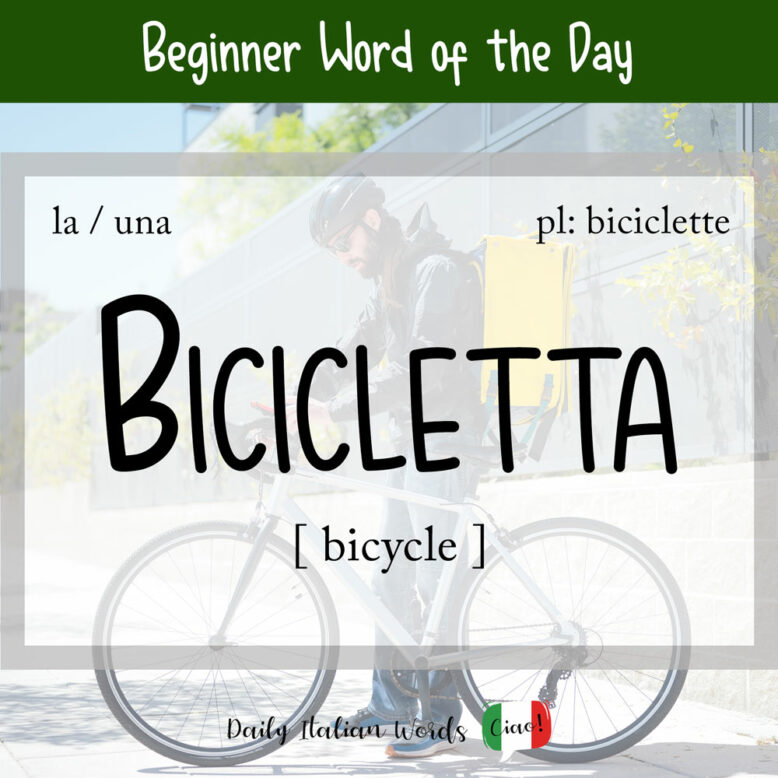The word for bicycle in Italian is bicicletta (feminine, plural: biciclette). Both the English and Italian terms were borrowed from the original French word for bicycle which was, you guessed it, bicycle. (These days the French prefer the words bicyclette and vélo.)

Just as the English word bicycle is normally abbreviated to bike, so too can you shorten bicicletta to bici.
Important: The word bici cannot be used to indicate a motorbike, which is known as a motocicletta, motociclo or moto in Italian.
A few common verbs that you’ll frequently see used with bicicletta include:
- andare in bicicletta = to ride a bicycle, to cycle, to go bike riding
- montare / salire in bicicletta = to get on a bicycle
- scendere / smontare dalla bicicletta = to get off the bicycle
- spingere la bicicletta a mano = to walk the bike
Andare in bicicletta fa bene alla salute.
Bike riding is good for your health.

When you go bike riding, it is always important to wear a bike helmet (casco da bici) and ideally, have a functioning bicycle bell (campanello) so that you can warn pedestrians of your presence. Children who are just learning how to use a bicycle may also need training wheels (rotelle) to avoid falling over.
If you enjoy bike riding as a hobby, the best place to practise is on a designated bicycle path (pista ciclabile) whereas professional cyclists (ciclisti professionisti) may want to take part in bicycle races (gare di ciclismo) on more challenging terrain.
Below are a few different kinds of bikes that exist:
- bicicletta da camera / cyclette* = an exercise / stationary bicycle
- tandem = tandem bicycle
- bicicletta da corsa = racing bike
- bicicletta da montagna = mountain bike (Italians often use the English term)
- bicicletta da strada = road bike
- bicicletta a motore = motorised bicycle
- bicicletta elettrica = electric bike
Note: cyclette is a French word whose spelling and pronunciation (/siklˈɛt/) has remained unchanged in the Italian language.

A very common expression in Italian is:
Hai voluto la bicicletta? E adesso pedala!
lit. You wanted the bike? So now pedal!
It is the equivalent of the English saying You made your bed, now lie in it!
Ladri di Biciclette
Ladri di Biciclette (Bicycle Thieves) is a 1948 drama film directed by Vittorio De Sica. It is one of the most important films of Italian neorealism, a national film movement that depicted stories of the working class. Very often directors employed non-professional actors and filmed in real locations rather than in studios.
Ladri di Biciclette tells the story of Antonio who finds a job that requires him to have a bici to ride around the streets of Rome and hang posters. His wife sells the dowry bedsheets in order for him to buy one and start working. But when Antonio’s bike is stolen, his life takes a turn for the worse and the only way to make things right is to find out who stole it!
The scene below shows the moment Antonio’s bike gets stolen.
You can watch the entire film on YouTube by visiting this link. Also, check out our list of Italian films you can watch online!
Heather Broster is a graduate with honours in linguistics from the University of Western Ontario. She is an aspiring polyglot, proficient in English and Italian, as well as Japanese, Welsh, and French to varying degrees of fluency. Originally from Toronto, Heather has resided in various countries, notably Italy for a period of six years. Her primary focus lies in the fields of language acquisition, education, and bilingual instruction.


